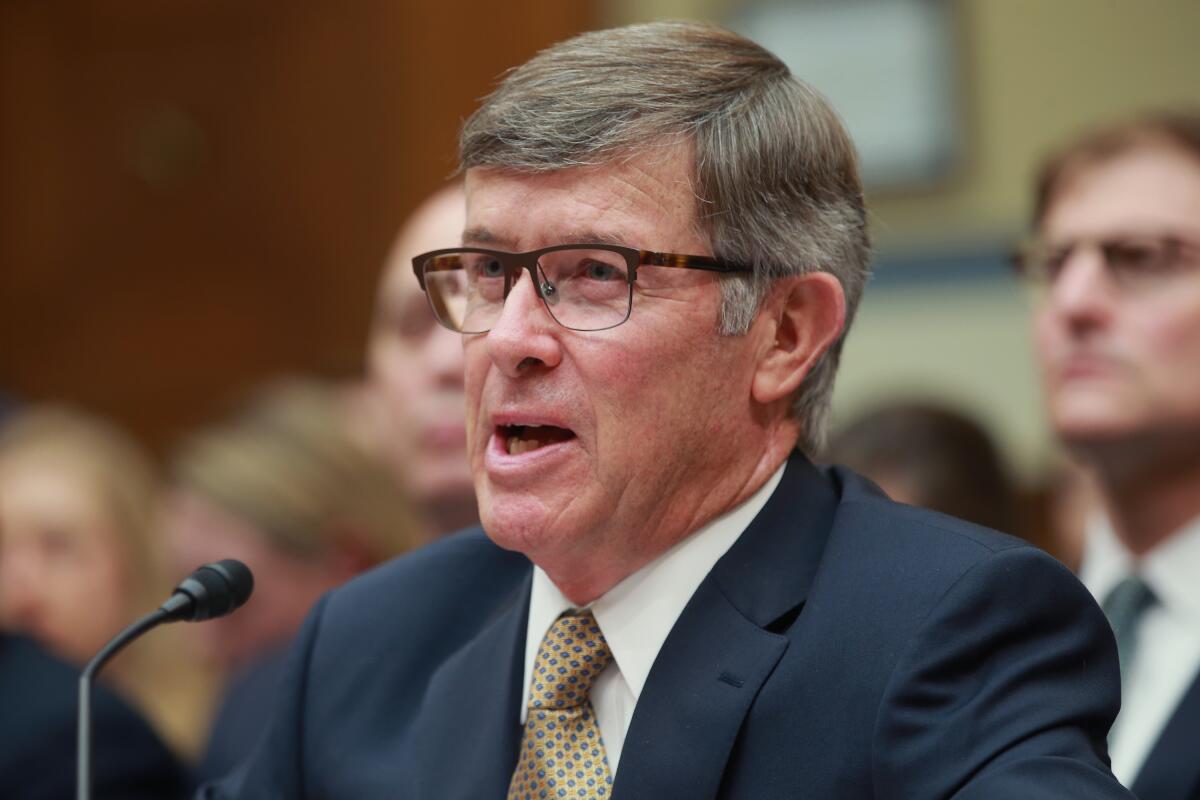Note to Democrats: Maguire came across as more victim than villain

- Share via
Toward the end of the House Intelligence Committee’s questioning of acting Director of National Intelligence Joseph Maguire, Chairman Adam B. Schiff (D-Burbank) tried to make it clear that Democrats weren’t questioning Maguire’s integrity.
“Director, no one has accused you of being a political stooge or dishonorable,” Schiff told Maguire.
Schiff’s comment was a reaction to exaggerated complaints by Republicans on the panel that that is exactly what Democrats were doing in probing Maguire’s decision not to turn over a whistleblower’s complaint about President Trump’s contacts with the leader of Ukraine. But it was also politically wise, because Maguire, a retired three-star admiral, came across at the hearing as more victim than villain.
Victim, that is, of what Maguire called an “unique and unprecedented” situation in which an unnamed member of the intelligence community used the whistleblower channel to report information “that the president of the United States is using the power of his office to solicit interference from a foreign county in the 2020 U.S. election.”
This was a reference to the now-infamous July 25 phone conversation between President Trump and Ukrainian President Volodymyr Zelensky in which Trump suggested that Ukraine investigate former Vice President Joe Biden.
The complaint, which was released publicly on Thursday, also contained the sensational accusation that senior White House officials were so worried about the conversation that they squirreled away records of the call in a computer system usually reserved for information about sensitive national security matters.
It was the intelligence community’s inspector general who initially told Congress about the complaint, without disclosing the details. Democrats argue that Maguire’s refusal to forward the complaint himself was a clear violation of a law requiring the director to inform Congress about complaints involving “urgent concern.”
Schiff returned to that theme at Thursday’s hearing, saying: “When the Congress said that something shall be done, and when that something involves wrongdoing of the president, it is not an exception to the statute.” But Maguire countered that, because the phone conversation might be protected by executive privilege, he consulted lawyers in the White House Counsel’s Office and then the Office of Legal Counsel at the Justice Department.
Democrats complained that in contacting the White House he was in effect consulting the target of the whistleblower’s complaint. (The complaint also cities Trump’s reference in the phone call to Atty. Gen. William Barr.)
Fair enough, but the executive privilege issue isn’t a trivial one. As this article in Lawfare explains, presidents — including Bill Clinton, who signed the Intelligence Community Whistleblower Protection Act — have maintained that they have a right to control the disclosure of classified information to Congress.
In his testimony, Maguire did not seem like a Trump stooge. Unlike the president, who has disparaged the unnamed whistleblower, Maguire said that individual “did the right thing” and “followed the law every step of the way.”
In any other administration, what Maguire did — run a vexing legal issue by lawyers in the White House and the Justice Department — would seem like due diligence. That it raises concerns among some lawmakers about a cover-up is a reflection of the fact that this president and some members of his administration have given ample cause to distrust their motives.
That’s not Maguire’s fault, which is why Democrats would be wise to point the finger at the real villain here: Trump.
More to Read
A cure for the common opinion
Get thought-provoking perspectives with our weekly newsletter.
You may occasionally receive promotional content from the Los Angeles Times.










